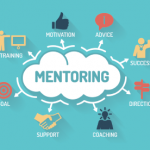Resource
Although professional status is important, it is not the most important prerequisite of a mentor. Rather, many mentees chose their mentors based on mutual interests or compatibility rather than professional achievements.5
Mentors should be reasonably well established in their own careers to have the time and ability to help mentees develop as an emerging independent investigator or clinician in their specific field of interest.
Mentors should also be prepared to help mentees create other mentoring relationships with colleagues within and beyond their setting so mentees can gain additional expertise. The notion of a mentoring team is increasingly popular, with the recognition of the value of meaningful research that results from interprofessional collaborations.
Mentees
For mentees, a critical responsibility is to be proactive. It is the mentee’s responsibility to seek out and cultivate a working relationship with a potential mentor. For young clinicians, this could mean asking about how the mentor approaches specific patient populations, therapeutic treatments or techniques. For emerging scientists, this could mean preparing research questions around a specific topic or coming to meetings with data from analyses or drafts of manuscripts or abstracts.
Mentees should listen non-defensively to feedback and feel able to respond to what they have heard, either incorporating suggestions the mentor has provided or stating why certain suggestions may not have been taken.
From a broader perspective, the mentee should reflect on whether their overall goals are understood and say something if not. The mentee should feel comfortable to state when they don’t understand something or don’t agree with a proposed approach.
Coming Together
The first step in building a mentoring relationship is to clarify expectations with respect to time commitment, frequency of meetings, mentee needs and ground rules, such as preferred working styles of both individuals. Mentors will need to review issues and limits related to confidentiality.
Personal Reflections
Dan’s Story

Dr. White
My first mentee-mentor relationship was as a young physiotherapist doing clinical work. I wanted to get involved with research and learned of a senior clinician at the clinic where I was working who had an active research portfolio. I spoke with him about working on a research project. Although this was an informal mentorship, it had a major impact on my decision to become a clinician-scientist.



